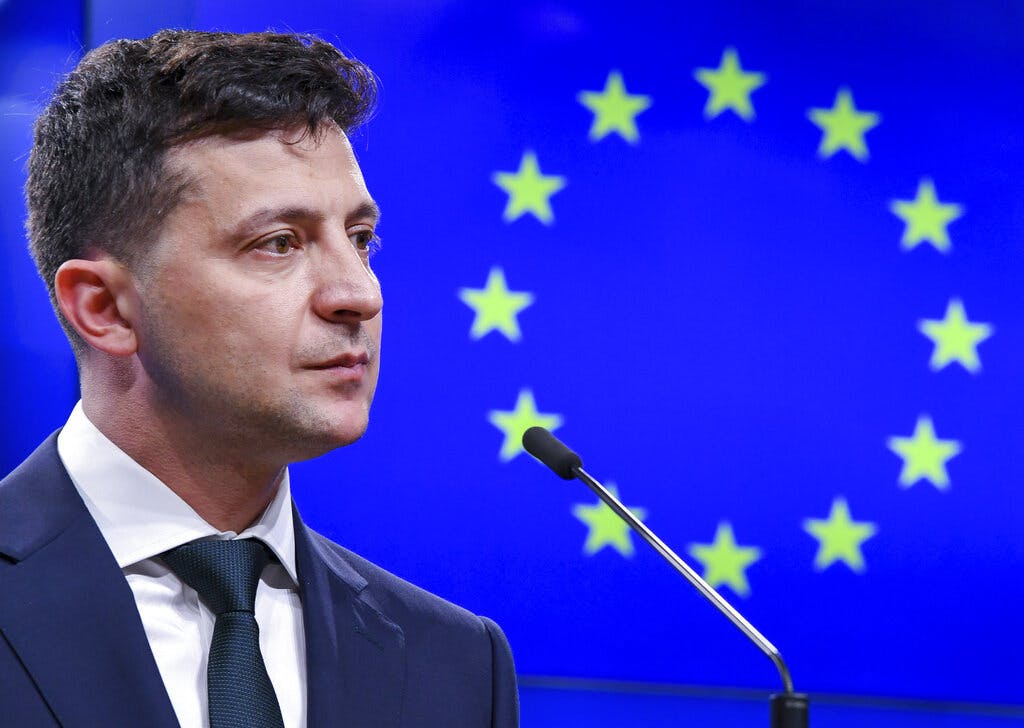Ahead of Versailles Summit, EU Taunts Moscow With Talk of Kiev Going Euro
President Zelensky’s recent request for the EU to fast-track Ukraine’s membership request was a dramatic if largely symbolic move, with many obstacles looming behind the headlines.

The prospect of Ukraine joining the European Union anytime soon is expected to land like a belly flop at a two-day summit of EU leaders at Versailles starting tomorrow. The idea was designed to at least splash in the direction of the neighborhood strongman, Vladimir Putin.
President Zelensky’s recent request for the EU to fast-track Ukraine’s membership request was a dramatic if largely symbolic move, with many obstacles looming behind the headlines.
The European Commission president, Ursula von der Leyen, for her part, has been almost studiously noncommittal, saying in a recent interview with CNN that while the people of Ukraine “belong in the European family” it would be “hard to say” when Ukrainians might actually be able to wave the EU flag.
Ms. von der Leyen’s statement in that interview that “reforms have to be done, processes have to be set up” was also a tacit acknowledgement that while they have been pushed off the radar by the Russian invasion, Kiev’s well-documented corruption problems haven’t gone away.
Given Mr. Putin’s drumbeat insistence on Ukraine distancing itself from NATO specifically and Western Europe generally, even bringing up the subject of Ukraine hopping on the EU bus could be seen by the Kremlin as a taunt as its war in that country heads into its third week.
While Russia is nowhere near as influential as it was before the collapse of the Soviet Union in 1989, the nuclear superpower still holds sway over several of its neighbors in Europe and keeps others in an uneasy neutrality. The idea of nudging Ukraine, Europe’s second-biggest country, fully into the Western fold against the will of Moscow poses problems.
European Union leaders will likely confront some of them head-on during what could become a bruising two-day summit. On its eve, the Estonian prime minister, Kaja Kallas, said that the EU needs “strategic patience, because peace is not going to break out tomorrow.”
Compounding the EU’s political problems, Moldova and Georgia, smaller nations that also fear the expansive reach of Russia, followed Ukraine’s tack within days and also asked for membership.
Many nations fear an immediate enlargement of the bloc and a reshaping of traditional spheres of influence would put the continent on the brink of a full-fledged war. There is no better example than Ukraine’s aspirations to join the 27-nation EU that could tilt the balance of blocs in Europe.
“Together with Ukraine, we stand firmly on the side of freedom and democracy. Ukraine is part of our European family,” the European Council president, Charles Michel, wrote in his invitation letter to the Versailles summit, choosing his words carefully and avoiding an outright promise of membership.
Even if support for Ukraine is overwhelming among the EU member states, granting membership is anything but automatic or even wishful at this stage.
The leaders of eight eastern member states officially backed Ukraine and one of them, Ms. Kallas, addressed the European Parliament in Strasbourg on Wednesday.
She insisted that “it’s not only in our interest to give Ukraine a membership perspective, it is also our moral duty to do so. Ukraine is not fighting for Ukraine. It’s also fighting for Europe. If not now, then when?”
At the same time Wednesday, in Paris, the Dutch prime minister, Mark Rutte, made the answer clear — not now.
After Mr. Zelensky’s emotional address last week, Mr. Rutte spoke with him on the phone Tuesday.
“I said, ‘I know your ambition for the short term, but this will not happen in the short term because this is a whole process taking many years. So let’s see what we can do now and tomorrow and next week or next month.’”
He insisted that possible membership for Moldova and Georgia would be even further off because they do not face an immediate threat like Ukraine does.
In the draft closing statement of Versailles summit on Russia, seen by the Associated Press, the leaders invited the executive European Commission “to submit its opinion on this application. Pending this and without delay, we will further strengthen our bonds and deepen our partnership.” It was leaning more Mr. Rutte’s way than the one Ms. Kallas wants.
“You have to be careful because it is a bureaucratic, tedious process,” Mr. Rutte said in a debate at the Paris Sciences Po university. “There are many questions which have to be answered. It will take many years.”
In the past, membership applications have sometimes taken decades. Turkey applied to join in 1987 and is nowhere close to membership. Four others are candidate countries now, but the EU has shown an extreme reluctance to expand further eastward. To allow Ukraine to leapfrog over the others would stir passions in the Western Balkans where several are awaiting a nod.
To be admitted, potential newcomers would also need to absorb all EU regulations, from rule of law principles to trade and fertilizer standards — about 80,000 pages of rules. Over the past years, the EU has often pointed out that Ukraine’s anti-corruption measures still lacked teeth.
